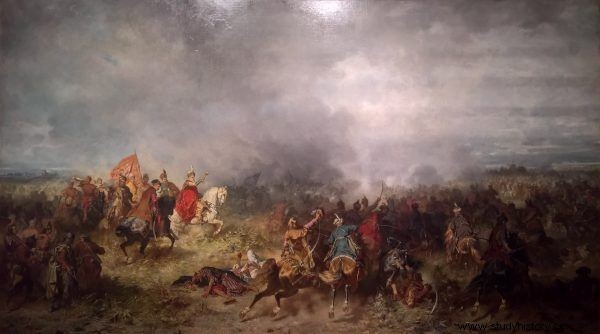He was second to none on the battlefield. However, his great talent manifested itself not only in the right decisions, but also in the words with which he kidnapped soldiers into battle, and also ... dragged enemies to his side!
Apart from his commanding talent, Jan Karol Chodkiewicz also showed great literary skills. His pre-battle speeches today sound as if they were written by the best Hollywood screenwriters.
Master of the broadsword and words
Before the Battle of Kircholm, he exclaimed:"The only hope rests in our hands and God's help!" When he stormed Pärnu (today a popular tourist resort in Estonia) in the early morning of March 2, 1609, he took his sword in his hand and, going to the fortress, cheered for battle:"Whoever is virtuous loves the king and his country, let him follow me willingly for the fame of his nation!" .
The speech he delivered at the beginning of the Battle of Khotyn in 1621, when he led the army of the Commonwealth, had to resist the mighty army of Sultan Osman II is also very impressive. Here is an excerpt from it:
We fight for our faith against pagans, against our enemies for the holy cross, we fight for the king, for the whole nation, we fight for saving lives and property! The blood of the beaten brothers is crying out to us for revenge, but it is still not well soaked into the land on which you are treading!

In 1621, near Chocim, Chodkiewicz successfully encouraged his subordinates to fight. The illustration shows a painting by Józef Brandt depicting the Battle of Khotyn.
Chodkiewicz was very sensitive to military honor. "I am not used to running away," he repeated. And his enemies were aware of it. When, before the Battle of Kircholm (fought on the river Daugava), King Charles IX of Sweden had a vision of the fleeing Chodkiewicz's army, one of the commanders, Anders Lennartsson, replied:”.
First:honor
He was also guided by the broadly understood honor towards his opponent - he did not show cruelty or obstinacy. Perhaps it was an event in 1601, when he was still serving under the command of Krzysztof Radziwiłł "Piorun".
The Swedish crew of Kokenhausen capitulated in exchange for the possibility of free departure. Meanwhile, a tumult broke out in the high-spirited branches of the Republic of Poland (the responsibility for it was wrongly attributed to Chodkiewicz). As a result, the Poles murdered some of the surrenders.
After the Battle of Kircholm, the hetman gave the aforementioned Lennartsson a funeral with honors, and the body of Prince Frederick of Lüneburg, engaged to the daughter of King Charles IX, sent him back to his would-be father-in-law. He let the Germans serving in the Swedish army go free on the condition that he swore that they would not fight against the Commonwealth any more.

You can read about the greatest leaders in our history in the book "Polish gods of war" .
It also happened that he tried to win foreign mercenaries to his side - in which his oratorical talent undoubtedly helped him. In 1604, on his way to Biały Kamień, he made such an offer to 500 foreigners, but they refused.
Five years later, after conquering the Pärnu, he showed his full persuasive skills - 155 Scots, recruited directly from the ranks of the Swedes, joined the Polish service at that time!
***
You can read about the secret of the successes of our greatest leaders in the book "Polish gods of war" . The above text is an excerpt from the chapter devoted to Jan Karol Chodkiewicz.
The title, lead, illustrations with captions, bolds and subtitles come from the editorial office. The text has undergone some basic editing to introduce more frequent paragraph breaks.
